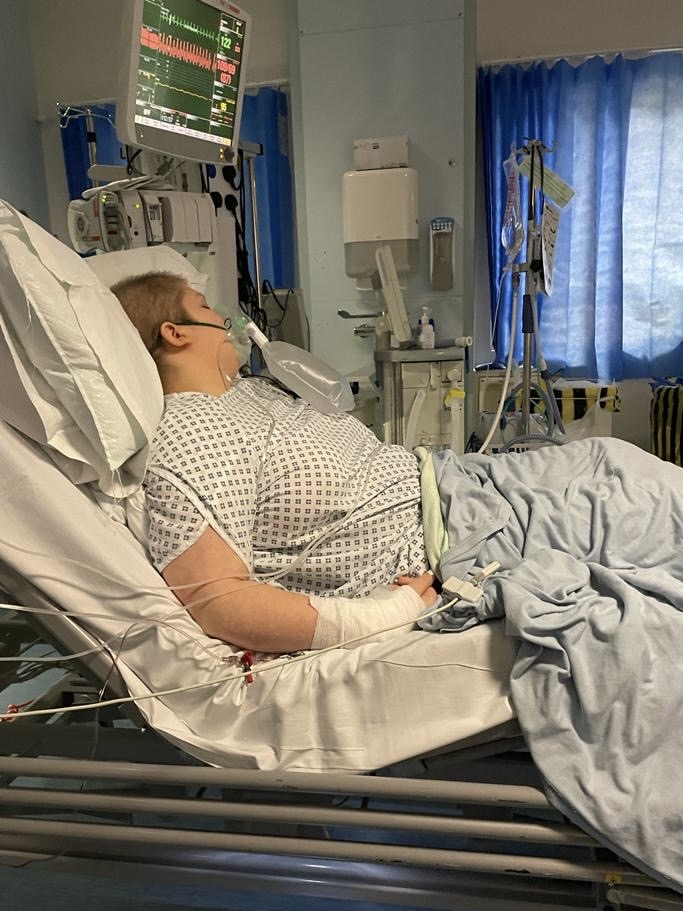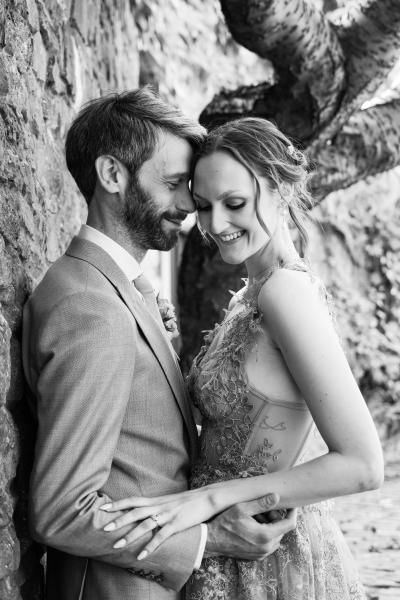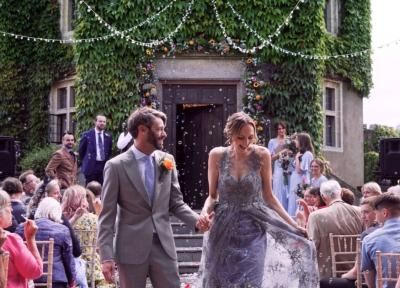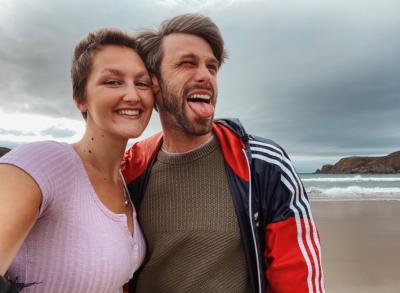Incurable cancer and me: getting married in the face of adversity
A year into remission from an earlier diagnosis, Verity was diagnosed with an incurable cancer condition. Following her initial misdiagnosis, she was told she had a rare, aggressive form of cancer called DSRCT sarcoma. She talked to us about how her husband has stuck with her throughout, their magical wedding in a castle, and her wider reflections as she faces the strains and uncertainties of incurable cancer for a fourth time.
How I ended up proposing in a castle
I’m lucky to have encountered a lot of really amazing people on all the paths I’ve walked in life. The best of this bunch is my husband. I remember giving him a get out of jail free card when I was diagnosed, saying: “You didn’t sign up for a girlfriend with cancer and if you’re unsure whether you’re committed enough to go through something like this, that’s okay.” He shut me down immediately and chose to continue building a life with me even though we hadn’t been together long, and now it’s been nearly eight years.
His unwavering devotion in the face of adversity has meant I’ve never had to face anything alone. For all the things life has thrown at me, I’m so grateful that it delivered me him first because he has consistently been the sun that breaks through the clouds. Between my second and third relapse, I decided I wanted to propose to him.
I do believe in fate. It was fate my husband and I met, and it was fate that once I’d begun planning how to sweep him off his feet – since he was always sweeping me off mine – I encountered the very person that would make it all happen – a glamorous force to be reckoned with and the owner of a hilltop castle, who also happened to be a Teenage Cancer Trust patron, asked about my story and, when I gushed about my partner, said: “Darling, where’s the diamond? He sounds perfect,” and the rest was history. Hearing my plan to propose, she asked me to stay there for his birthday and propose on the balcony, and afterwards when I sent her the photos of our engagement she generously offered her castle as a wedding venue “whenever that may be.”
It transpired that I needed more treatment a few months later due to, as I say, “my cancer being a bit dramatic again,” and I contacted her to see if there was a possibility of getting married soon, as “sh*t’ hit the fan.”
She said she’d had a cancellation and it was free on 2nd July and suddenly we had a wedding to plan in 4 months. Despite my weakness, fatigue and pain, having a project helped me hugely at a time when going forward just felt like getting closer to the end. When you’re ill, all anyone wants to do is help; the trouble is most of the time there is nothing they can do save offering you a listening ear and a shoulder to cry on. Now there was something they could do.
The wedding
My mum’s best friend made the dress, her photographer friend offered her time, and everyone rallied around to help with all the other preparation — the set-up, the flowers, the food. Due to the baking skills that I acquired during lockdown, I even made the cake and dessert table myself. Some of my family and the wedding party stayed at the castle all weekend, and the night before the wedding we went swimming in the pool at 1am after having a late night doing the final touches. My maid of honour stayed with me that night in the bridal suite and, giddy with excitement, we tried our best to get to sleep.
Despite rain in the morning, the afternoon was clear and blue and the sun burned brightly above us. It truly was a metaphor for our relationship — our reward for enduring the bad was more time with each other.
Initial diagnosis at 17
I was an ordinary 17-year-old on birth control — bloated, tired and full of anxiety. But when my stomach started noticeably bulging and lying down became uncomfortable, alarm bells started ringing, and a phone call later I was face-to-face with my doctor who revealed I might be 12 weeks pregnant. Since a negative pregnancy test said otherwise, I was sent for an urgent ultrasound. The internal scan revealed an 11cm mass not a baby, most likely a dermoid cyst. The plan was to watch and wait. For what? I didn’t know. All I knew was that the pain was worsening and by the end of the month I was unable to comfortably lie down. One night when it became unbearable, I went to A&E.
Eventually, I was referred to gynaecology oncology who wanted to operate the following day. I was oblivious to the fact that oncologists treated cancer. I didn’t care who cut me open, if pulling some of my insides out stopped the pain then I was all for it.
I was blindsided and yet it was totally obvious in hindsight when my surgeon told me that the unexplained fast-growing lump was actually a tumour. I asked to see a picture of it while my mum sought the comfort of my hand, refusing to let go. I remember thinking, staring at the gross slices of veiny tumour: “Being pregnant wouldn’t have been so bad.”
I asked to see a picture of the *rugby-ball sized tumour that in two short weeks had doubled in size and caused me to lose my left ovary and appendix and gain a large vertical scar.
Treatment and remission
In between the signing of consent forms for chemotherapy there was crying, hysteria, confusion, I even cracked some jokes through the tears in an attempt to reassure my partner who remained stoic. And then there was an odd calm where words completely failed me and I sat there in silence, numb, wondering what I’d look like bald.
Reader: I rocked it. With a clear CT scan in January 2018, I was officially in remission — free, relieved and absolutely terrified. Suddenly I was cast back into a world that hadn’t changed when I’d changed so much in every way, and I was somehow supposed to just move on, with more life experience but less life expectancy. I had to find a way to move forward with the added struggle of this new, heavy baggage.
Remission was a short-lived freedom. That September the pain started again and back I went to hospital, hoping it was nothing. And that’s what they told me – that there’s nothing on the scan.
Missed tumours, relapse and operation.
“You’ve got to manage the paranoia,” they said. I was another patient uncertain of how to navigate the world after trauma, scared of every ache and pain, nothing more. The following year, in May 2019, I started pushing back, insisting that this pain wasn’t phantom, that there had to be something worth investigating. My persistence paid off because then the dreaded news came. There was more cancer in my abdomen and, worst of all, it had been there on the September scan. They’d just missed it.
The collection of tumours were hard to count as they were sprinkled “like sugar” in clumps around my abdomen which meant surgically removing them would be challenging and possibly unsuccessful. I tolerated the prospect of surgery well since I just had to lie there on a table while other people helped me outrun cancer for a little longer. It was the anxiety eating away at me that I struggled with — still struggle with.
Come operation day I welcomed the general anaesthetic because I knew it would at least give me a break, even if the surgery wasn’t successful. But it was, all 9 hours of it. I may have suffered a full hysterectomy, bowel resection and more trauma to my abdomen, but the cancer was out. It was a win.
Being diagnosed again and facing incurable cancer
I already had cancer and knew I needed more chemo so expected the follow-up appointment to be relatively underwhelming and went in alone. I could handle it, I thought. What’s worse than cancer coming back? It turns out that being told you don’t have the cancer you’d grown to accept is not that great either. Walking into that room and seeing much the same display as I had two years prior, I knew something was wrong. “You don’t have ovarian cancer. You have DSRCT sarcoma.” It was like being diagnosed all over again.
I had tried to find myself again during my false remission — I went on several courses, to festivals, on holidays, completed Tough Mudder, and became a climbing instructor — and I realised that I hadn’t even properly familiarised myself with that new me before she was stripped away. Again. With the illusion of having a choice, because the alternative was dying and I wasn’t ready to choose that, I signed the consent forms and just hoped that I’d have the strength to meet the next version of myself. Facing ‘incurable cancer’ for a third and fourth time.
Clinical trial and learning to celebrate the small wins
From March 2020 onwards they monitored me with scans and lymph node checks. Things remained okay for longer than I think anyone expected but then the sizes of those nodes started to creep into the danger zone.
Two days before Christmas 2021 brought news that further treatment was required — my third run in with cancer. Luckily, by this point a specific treatment for DSRCT that I was eligible for had become available in the form of a clinical trial at The Royal Marsden. My new consultant had once told me to “stay as well as you can for as long as you can because there might be more options down the line” and she’d been right.
This time when I signed the consent forms so I could be, once again, pumped full of toxins, I wondered how far along in this marathon I was. How close was the end? When does incurable cancer become terminal? I still have so many questions that I know will likely go unanswered because some of them are too difficult to even ask. Now that I’m starting more treatment in 2024 for a fourth time having to come off the trial I’d managed to stay on for 2 years, I’m not sure I want to know the answer.
The ambiguity of it all might be better than living like a ticking time bomb. My seventh cancerversary is approaching this summer which is still inconceivable to me as there have been so many points I’ve wanted to give up. I tell myself to celebrate the small wins because though they might be short-lived, they’re no less significant. The seven-year milestone is something to be proud of and so was managing to get out of bed this morning.
Teenage Cancer Trust experience
I’ve found that the Teenage Cancer Units at both hospitals I’ve been treated at, Bristol and The Royal Marsden, have been brilliant in their ability to sustain me when I’ve been depleted. I’ve had countless opportunities to enrich my life and find joy where there’s miserable uncertainty. It can be as overwhelming as it is beneficial speaking to other people who are also residents in this different world, but Teenage Cancer Trust provides such great opportunities that balance escapism and immersion.
The medical professionals can fight to restore you to health but while they’re treating you physically, who’s helping you to heal the other wounds? Cancer takes many different tolls on you — social, economic, mental, emotional, as well as physical. I’ve found that charities like Teenage Cancer Trust and Teens Unite really help. Since the last couple of years for me have been an almost never-ending limbo, Teenage Cancer Trust’s Youth Support Coordinator at The Royal Marsden helped me cultivate a “why not” attitude that’s involved me writing down anything I can think of that I want to do and seeing if we can make it happen. One such wish was skydiving which I did last summer with the Red Devils and was generously funded by The Alexandra Sales Trust.
Advice and reflections on cancer
Cancer is really cruel and ugly but those sun-shiny moments – that reflect in the shattered remnants of what it destroys – are ones I wouldn’t trade for the world.
The fact I have so much to lose means I had a whole lot to begin with and so I can’t help feeling like I need to practice gratitude (and I mean practice because it’s not something that comes easily). So I say “f*** you cancer for messing me up beyond recognition, but thank you for not killing me yet.”
For anyone who doesn’t know, it’s really lonely. You can’t escape your brain or replace your body, and it gets tiring and frustrating — for you and those supporting you. But there’s no benefit in holding onto anger. At some point you’ve just got to let bygones be bygones and until I’ve said “bye” and I’m gone, I don’t want to waste time complaining.
I’ll have a cry, and a moan and be thankful when a new day dawns. I’m rewarded every day with the love of my family and friends — the many FaceTimes with my mum, catch-ups with friends, and walks with my dog and husband who is probably bored with hearing how much I love him but knows there’s a limit to how much I’ll get to tell him so enjoys each admission like it’s simultaneously the first and last. Though I’ll never be able to outrun the inevitable, I’ve got people walking this path with me holding my hand. And when I can’t walk anymore, I’ll rest.




